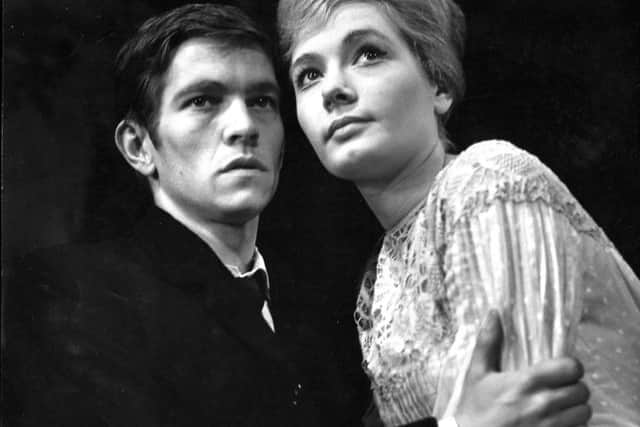Interview: Sir Tom Courtenay enjoying a film resurgence


LOOK at them,” Tom, sorry, Sir Tom Courtenay says, with an unsubtle nod to a couple sitting at a table near us in a hotel lounge. “I was in here earlier to eat a sandwich and they were here then. And they’re still here.” He rolls his eyes. “And here we are, we’ll have done my whole life in 30 minutes.”
Not quite. We talk for longer than 30 minutes as it happens. And we don’t get anywhere near whole life levels of detail. And not for lack of trying. Courtenay is an unconventional interviewee. He’s not really one for questions and answers. He often starts stories in the middle, leaving me playing catch up and wondering how I’ve missed the start until I realise, often, there isn’t one and there might not be an end either. And yet he’s fascinating. He quotes Philip Larkin (he did a well received one-man show, Pretending to Be Me some years ago) we look at photos of his dog on his smartphone (a handsome English pointer called Stanley snapped inexplicably gazing at a magazine cover adorned by Colin Firth – he sent it to Firth, with whom he starred in Gambit a few years back, for his amusement.) At one point there’s a long explanation of the importance of the glasses he wears when he takes a job – two pairs are provided both with an anti-glare coating to avoid flare from the studio lights. “As soon as I get a job, the first thing I really start to fuss about is the glasses,” he says, pouring tea into his cup. “I’ve just finished a telly thing and the glasses will play a big part. They’re not as nice as these,” he says, taking off the pair he’s wearing for a closer inspection. “They’re squarer.”
Advertisement
Hide AdAs for getting to the chat about The Legend of Barney Thomson – the reason that we’re drinking tea and blethering on a sunny afternoon during the Edinburgh Film Festival – it’s no easy task. But I can’t really care. That’s not to say anything against Robert Carlyle’s directorial debut (the title comes from Douglas Lindsay’s The Long Midnight of Barney Thomson, on which the film is based). It’s a bleak, funny serial killer caper, replete with a show-stealing turn from Emma Thompson as Cemolina, Barney’s chain-smoking, slosh-dancing mother. The supporting cast includes Ray Winstone, Ashley Jensen and James Cosmo, while Courtenay plays the ascerbic Chief Inspector McManaman, a perpetually grumpy copper who refers to his officers by their numbers rather than their names.


“It was good fun,” Courtenay says. “I’m really pleased for Bobby because I’m very fond of him. That’s why I did it. I said to him it’s not much of a part and he promised me I’d have a good time.” He shrugs. “They made me so welcome. He [Carlyle] had the art department decorate superintendant…” he pauses, clearly having forgotten his character’s name. I prompt him. He nods. “They changed his name. It didn’t affect me because I didn’t say it. The art department decorated his office with Hull City photographs. And they found my old grammar school and used that photograph too.” They also said that McManaman should be posh, but Courtenay insisted that he wouldn’t be. He calls all his underlings by their numbers and that made Courtenay think of someone else: Brian Clough. “Cloughie would say, ‘Do you mean number nine?’ That was his son.” Courtenay smiles.
Have I mentioned that Courtenay is funny. Wry. And a bit twinkly. Carlyle was nervous before the premiere he says, so he told him that if he wasn’t nervous for the first screening of a film in which he starred and directed, there’d be something wrong with him. “Then later on we were waiting to be presented and I was teasing him. I said, ‘well, you know Dustin [Hoffman, who directed Courtenay in Quartet] said a film is all direction, that’s it, end of story. So Dustin said, when the actors are bad, blame the director.” He laughs.
He’d worked with “Raymondo” (his name for Ray Winstone) before and “lovely Ashley” too. “She goes around telling people I’m a leg-end.” He laughs. “Not to some of the young ones. Last night we were on the red carpet and were asked all of these questions and then I got to the end and there was a man interviewing another man and he said, ‘do you mind?’ and I said no, and he said, ‘no, would you mind moving out of the way’. That’s how much of a legend I am.” He fiddles with his tea cup. “It doesn’t matter.”
But this is Tom Courtenay we’re talking about. Billy Liar opposite Julie Christie. Pasha Antipov in Dr Zhivago. Colin Smith in The Loneliness of the Long-Distance Runner. I’d go on about it more, but he tells me it can be “a bit annoying” when that’s all that people focus on, so I won’t. But what I will say is this – Courtenay was at the heart of what was called the British New Wave. His performances marked him out as something special. But while the others – Albert Finney, Alan Bates, Peter O’Toole, then Michael Caine and Anthony Hopkins – made hay in the Hollywood sunshine, Courtenay couldn’t settle himself in that world and soon retreated (that’s his word, not mine) back to the theatre.


“I met an American lady once and she told me that at her high school everyone was in love with Pasha. I said, ‘who is Pasha?’ It was just a pity they didn’t have a way of letting me know. It had much more of an impact than I knew. I was pals with Julie from Billy Liar. She was never much interested in the theatre. She once sent me a card that said, ‘how’s the plays?’” He smiles. “I was discovered so young, it was too much for me. I didn’t realise just how huge Dr Zhivago was. I didn’t look to cash in. I did a couple of films for the money and I didn’t enjoy either of them so I retreated back not only to the theatre, but to the theatre in Manchester.”
Advertisement
Hide AdBorn in Hull in 1937, Courtenay, mainly due to the tutoring and support of his mother, Annie Eliza, a woman who made her living braiding fishing nets but who had a deep love of literature, passed his 11 plus, made his way to grammar school where he became head boy then on to University College London to read English. He didn’t get his degree – the first in his family to go to university, the pressure was hard to bear and he buckled before his finals – but he did discover a love of acting and auditioned for Rada, being awarded a full scholarship. He was discovered during his final year and cast as the disaffected student Konstantin in the Old Vic’s production of Chekhov’s The Seagull. And not long after his connection to Edinburgh began.
“I went to the Traverse this morning,” he says, out of the blue. “I did Moscow Stations there. It’s probably the best thing that I ever did on the boards. I went there this morning.” Has it changed? “I couldn’t remember what it was like. There were two girls there. I couldn’t get into the theatre.”
Advertisement
Hide AdDid you tell them who you were, I ask. They would’ve been delighted to show you around, I’m sure. He looks embarrassed at the very thought. “And then just round the corner was the Lyceum where I started with The Seagull. And in between there was Hamlet at the Assembly Hall. A monster place. They put in a matinee after the opening. Nearly killed me.
“When I said I’d come here [to the Edinburgh Film Festival] to Bobby it was for him, but I also love to be here. I find it very emotive. There’s all this frontage on the Lyceum but I stood in it and looked at the staircases which are still the same. The auditorium was cordoned off so I didn’t say anything or try to get in. I remember seeing the queues and I thought they were for The Seagull but they were for something called Beyond the Fringe. They did the show after us. I bumped into Jonathan Miller once and he said, ‘we started off together’. We did.”
Since that blazing beginning in the 60s, Courtenay may have side-stepped away from cinema on the whole, but he has made the most of his talent on stage. Shakespeare, Ayckbourn, recently Brian Friel’s The Land Owner at The Gate in Dublin and his own adaptation of the Larkin monologue. There have been TV appearances too in The Royle Family and Little Dorrit. But Courtenay’s enjoying something of a big screen resurgence, which isn’t bad at the age of 78. The Legend of Barney Thomson wasn’t the only film he is in at the EIFF. His other, 45 Years, scooped the Michael Powell award for best British feature film. Directed by Andrew Haigh, Courtenay stars with Charlotte Rampling as a married couple whose relationship is thrown into chaos on the eve of their 45th wedding anniversary. It’s clear that Courtenay is thrilled with it. “It was tailor-made which doesn’t happen often,” he says. “My romantic lead. It’s no bad thing at my age to have such a part. I can’t think of anybody else who could’ve done it. And it’s not often I think that.
“After I’d done the speech at the anniversary party, I felt very good. Tingly, the blood flowing. The setting was so good, it was like I was there in the place, the camera wasn’t on top of me. I made things up, told jokes, there were pauses when I got emotional. That was more like a theatre thing because it was all my timing. Quite extraordinary.”
Our time is up. Courtenay has another interview to do and despite offering that I might like to stick around for it (he’s quite mischievous as well as funny) it’s time for me to go. He takes my hand in one of his and his other hand comes up to my face. For a minute I think he’s going to pinch my cheek but he doesn’t, he just puts his hand on my face and smiles at me. It’s the sweetest thing. As I turn away from him, I see the couple he noticed when we first sat down. They’re in exactly the same place, still deep in conversation. “They’re still here,” I say. He doesn’t hear me at first and so leans forward. I do a comedy head nod towards the couple. He clicks and his eyes widen. He pulls his shoulders up in a ‘what on earth can they be talking about?’ gesture and then shakes his head.
• The Legend of Barney Thomson is in cinemas from Friday